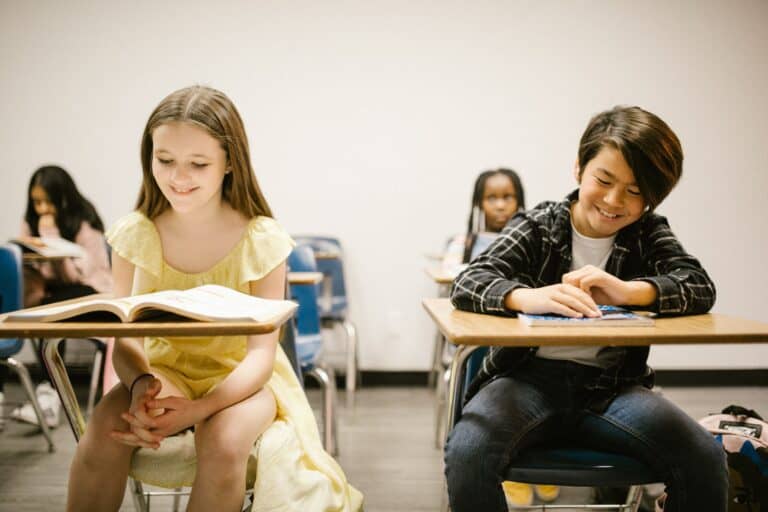Discussion Skills as Democracy Skills: One Educator’s Framework
Discussion skills are critical for learning and for life – and that fact has become even more glaringly obvious in our hyper-polarized world. At R.E.A.L. ®, we’re convinced that teaching today’s teens how to engage in thoughtful, respectful face-to-face conversations isn’t just good for their GPAs – it’s critical for our entire society.

In our view, discussion skills are democracy skills – and it’s essential that we endow students with the foundational skills they’ll need to be citizens of the world.
We recently came across a compelling, comprehensive, easy-to-remember framework for skills that uphold civil discourse. John French, incoming High School Director at St. George’s Episcopal School in Milner, Georgia, created the SAFE framework, which champions the cultivation of Self-awareness, Active listening, Fact-checking, and Empathy in today’s students.
Read on to learn more.
SAFE: Skills that Uphold Civil Discourse
by John French
Self-awareness: Former Meet the Press anchor Tim Russert used to say that the best way to interview a given subject is to take on the opposite opinions and work back at them from there. The result was usually collegial, if combative (John McCain once playfully compared it to an interrogation in the Hanoi Hilton), question-and-answer sessions. What is needed for true self-awareness is to use Russert’s strategy in evaluating one’s own biases. Students must be able to critically examine the various factors that have contributed to their own predispositions. Being able to evaluate the biases inherent in one’s own perceptions of how the world should be allows one to not only be empathetic towards others but also to enhance and refine one’s own debate skills. Self-awareness also means recognizing when one needs to pause, if only briefly, before responding. This is also a good opportunity to clarify (thus demonstrating active listening) that one understands their counterpart correctly.
Active Listening: In a deleted scene from the 1994 film Pulp Fiction, Mia Wallace (played by Uma Thurman) asks Vincent Vega (John Travolta) “Do you listen or wait to talk?” Vega responds “I wait to talk, but I’m trying to listen.” (1) What they were really talking about is the difference between different types of listening. Passive listeners merely wait to talk and pounce at the opportunity to get their own opinion heard. These opinions are usually immutable and not subject to change based on what others have said. Active listening means making a sincere effort to discern as much value as possible from hearing the ideas of others. It is predicated on one assuming the best intentions of others and an honest intention to reflect upon and understand the speaker’s points. The ability to then accurately paraphrase the speaker’s words – and to accept correction from the speaker if incorrect – is crucial to successful active listening. Good active listeners ruminate upon what they hear and analyze both its strengths and weaknesses, resisting the urge to ambush, distort, and/or ascribe motive to the arguments or parts of arguments with which they disagree.
Fact-checking: Former four-term New York Senator Daniel Patrick Moynihan remarked once that “Everyone is entitled to his own opinion but not his own facts.” The editor of Senator Moynihan’s collected letters, Steven Weisman, commented that Moynihan’s words constituted “one of many comments that entered political lore and that, if applied, would make for a healthier national discourse today.” (2) Both are correct. It is more difficult than ever to discern fact from opinion. Differentiating between the talking points on cable news networks and those of political parties or special interests can be quite difficult. Exacerbated by technology and its own fragmentation, the failures of the fourth estate have left the void of a basic set of facts upon which civil discourse must be based. Clicks drive newsroom decisions. Instead of laying out the facts for the consumers of news to draw their own conclusions, various media outlets simply reaffirm to small percentages of the population everything it already believes. The consequences of this have been laid bare for all to see. In order to have a substantive conversation, truth and facts matter. Being prepared with data and appropriate evidence to back up one’s assertions is essential. In order to solve the enormous problems that we have, we must be able to see their existence, even when they tell us something at odds with our perception. This is a cornerstone of academic debate and honesty. Perceptions and conclusions can and must evolve as facts and data emerge. As John Adams famously declared, “Facts are stubborn things, and whatever may be our wishes, our inclinations, or the dictates of our passion, they cannot alter the state of facts and evidence.” (3)
Empathy: Legendary film critic Roger Ebert once said “I believe empathy is the most essential quality of civilization.” (4) Given what passes for debate and discourse in this country at the moment, it is difficult to disagree. We don’t all, and shouldn’t all, have the same opinion on everything. Variety is the spice of life, so the old cliche goes. It is crucial that we understand and value the views and feelings of our friends and colleagues. It is essential to productive discussion. As students and teachers, we must assume the best intentions of others. Mutual respect is essential to achieving the empathy necessary to have meaningful intellectual debates and civil discourse. Being able to step outside one’s own biases and see an issue from another’s point of view not only makes for a more collaborative and collegial classroom experience but also sharpens their own critical thinking skills in the process.
- Pulp Fiction (deleted scene), directed by Quentin Tarantino (Miramax Films, 1994).
- Moynihan and Weisman quoted in Lindsey Bever, “This GOP Senator just attributed a well-known liberal quote to Ronald Reagan,” Washington Post, March 15, 2017.
- John Adams quoted in Massachusetts Business Alliance for Education, https://www.mbae.org/facts-are-stubborn-things/.
- Roger Ebert quoted by Jon Terbush in “Roger Ebert’s most memorable quotes on life, death, and the movies,” The Week, January 8, 2015.






